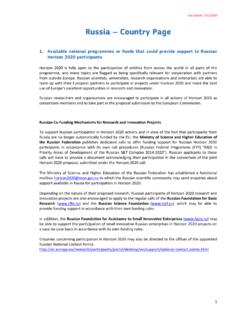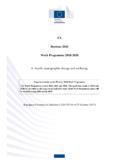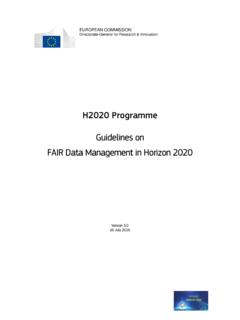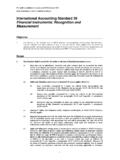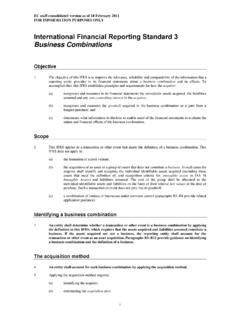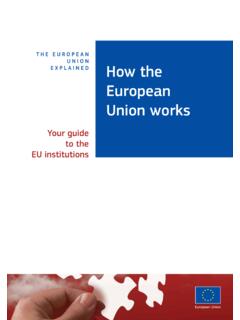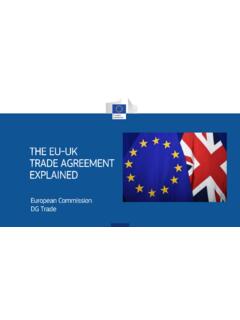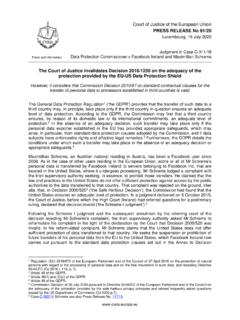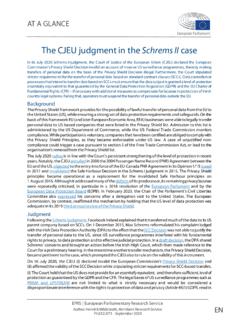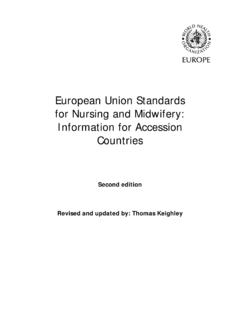Transcription of Buying green! - European Commission
1 Buying green! A handbook on green public procurement3rd EditionEnvironment2 More information on the European union is available on the Internet ( ).Cataloguing data can be found at the end of this : Publications Office of the European union , 2016 Design: : Stephan K hler (ICLEI)ISBN: 978-92-79-56848-0doi: 10. 2779/24 6106 European union , 2016 Reproduction is authorised provided the source is in BelgiumPrinted on recycled paper that has been awarded the EU Ecolabel for graphic paper ( )Important noticeThis handbook is an indicative document of the Commission services and cannot be considered binding to this institution in any way. It should also be noted that the content of the handbook is subject to the evolution of EU law, including the revision of the Procurement Directives and case-law of the Court of Justice.
2 It represents the state of play as of February third edition of the Handbook has been compiled under Contract No 071201/2014/692772// between the European Commission and ICLEI Local Governments for Sustainability, supported by Public Procurement Analysis (PPA).Europe Directis a service to help you find answers to your questions about the European union Freephone number (*): 00 800 67 89 10 11(*) Certain mobile telephone operators do not allow access to 00 800 numbers or these calls may be Green procurement: the essentialsChapter 1 Implementing GPP Policy1. 2 Setting priorities and targets1. 3 Training and Sources of GPP criteria1.
3 5 Using e-procurement Monitoring & reviewing NetworkingChapter 2 The procurement process2 .1 Basic principles of public Choosing the Consulting the Making a business case for Framework agreementsChapter 3 Defining the requirements of the Defining the subject Environmental technical Specifying materials and production Use of Using GPP criteria and Verifying compliance with technical specificationsContentsChapter 4 Selecting and excluding Exclusion Selection Means of Evaluating groupingsChapter 5 Awarding a General rules for awarding a Applying environmental award Life-cycle costing (LCC)
4 Abnormally low tendersChapter 6 Contract performance clauses6 .1 Rules governing contract Contract performance clauses for the supply of Contract performance clauses for the provision of works or services Monitoring contract complianceChapter 7 Key GPP Buildings7. 2 Food and Catering services7. 3 Road transport vehicles7. 4 Energy-using productsAnnex Relevant legislation and policy4810101113151718192020212224252728 2832343737404242434449495050535761626264 6566686870727476..4 GPP is defined in the European Commission s Communication Public procurement for a better environment as a process whereby public authorities seek to procure goods, services and works with a reduced environmental impact throughout their life-cycle when compared to goods, services and works with the same primary function that would otherwise be procured.
5 1 This handbook outlines the possibilities to pursue GPP under the 2014 Procurement GPP can be applied to contracts both above and below the threshold for application of the Procurement Directives. The 2014 Procurement Directives enable public authorities to take environmental considerations into account. This applies during pre-procurement, as part of the procurement process itself, and in the performance of the contract. Rules regarding exclusion and selection aim to ensure a minimum level of compliance with environmental law by contractors and sub-contractors. Techniques such as life-cycle costing, specification of sustainable production processes, and use of environmental award criteria are available to help contracting authorities identify environmentally preferable bids.
6 This handbook is designed to help public authorities successfully plan and implement GPP. It explains the possibilities offered by European union law in a practical way, and looks at simple and effective approaches to greening contracts. The handbook follows the logic and structure of a procurement procedure. It also gives many real examples of green purchasing by public authorities across the It has been produced for public authorities, but many of the ideas and approaches are equally relevant for corporate purchasers. It should also help suppliers and service providers particularly smaller companies (SMEs) to better understand the environmental requirements increasingly encountered in public public authorities in Europe practice not only GPP, but SPP Sustainable Public Procurement including both environmental and social criteria in their purchasing decisions.
7 This handbook looks specifically at the environmental aspects of tendering. The 2014 directives also provide a number of new opportunities for socially responsible procurement, which are not considered buy green?Government expenditure on works, goods and services represents around 14% of EU GDP, accounting for roughly EUR 1,8 trillion annually4. By using their purchasing power to choose goods, services and works with a reduced environmental impact, they can make an important contribution towards local, regional, national and international sustainability goals.
8 GPP can be a major driver for innovation, providing industry with real incentives for developing green products and services. This is particularly true in sectors where public purchasers represent a large share of the market ( construction, health services, or transport). GPP may also provide financial savings for public authorities especially if you consider the full life-cycle costs of a contract Green Public Procurement (GPP) is an important tool to achieve environmental policy goals relating to climate change, resource use and sustainable consumption and production especially given the importance of public sector spending on goods and services in COM (2008) 400 at page Directive 2014/23/EU of the European Parliament and of the Council on the award of conces sion contracts ( the Concessions Directive ).
9 Directive 2014/24/EU of the European Parliament and of the Council on public procurement and repealing Directive 2004/18/EC ( the Public Sector Directive ); and Directive 2014/25/EU on procurement by entities operating in the water, energy, transport and postal services sector and repealing Directive 2004/17/EC ( the Utilities Directive ). This Handbook refers primarily to the Public Sector Directive, however most of the same possibilities for pursuing GPP also exist under the other two Important notice: Although the information in the handbook has been carefully checked, the European Commission accepts no liability or responsibility with regard to the specific cases mentioned in the handbook or the linked European Commission (2015) Public Procurement Indicators 2013.
10 These figures exclude spending by utility companies; earlier estimates (2011) including utility procurement were of around 19% of EU GDP, accounting for more than EUR 2,3 not just the purchase price. Purchasing energy-efficient or water-saving products for example, can help to significantly reduce utility bills. Reducing hazardous substances in products can cut disposal costs. Authorities who implement GPP will be better equipped to meet evolving environmental challenges, for example to reduce greenhouse gas emissions or move towards a more circular legal frameworkThe legal framework for public procurement is defined by the provisions of the Treaty on the Functioning of the European union (hereafter the Treaty) and by the EU Procurement Directives, as interpreted by the European Court of Justice.

